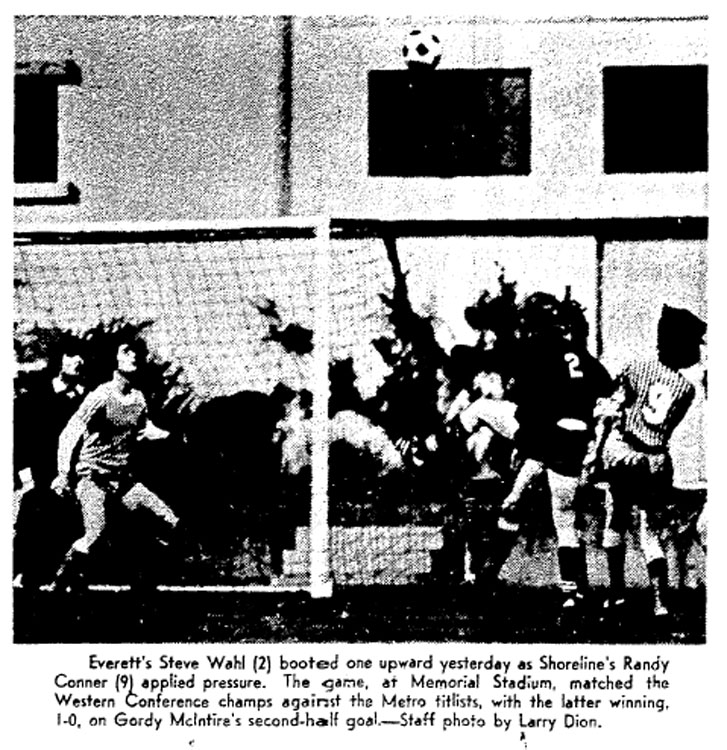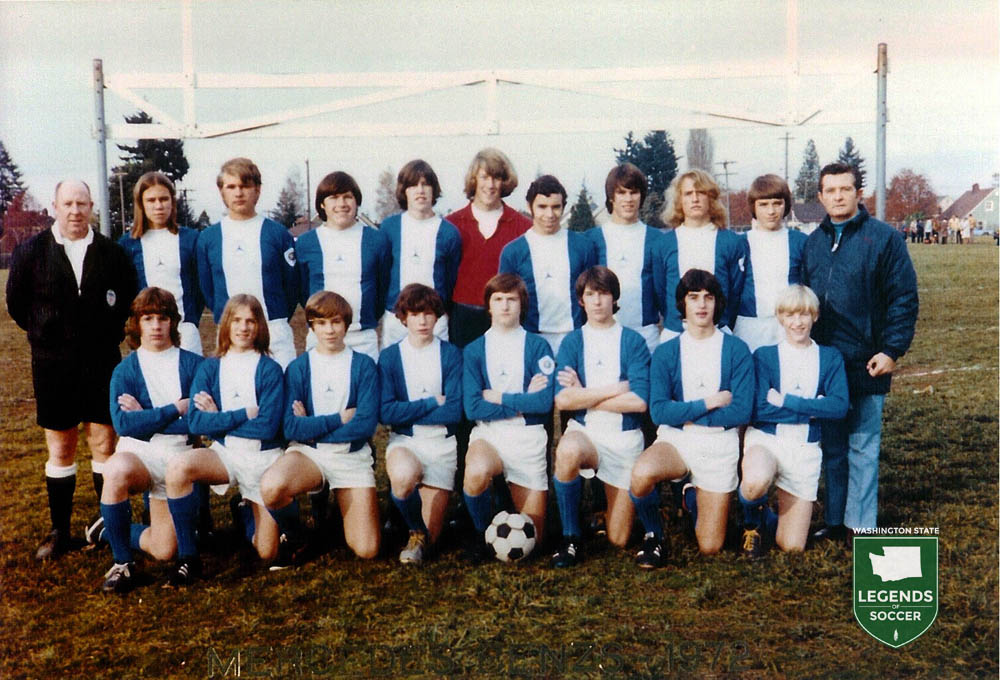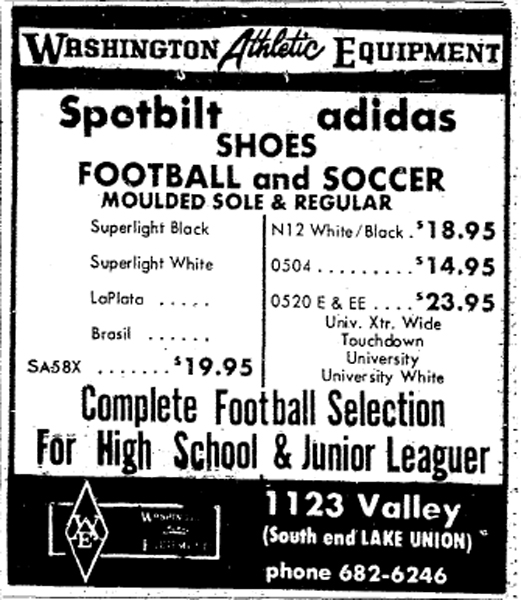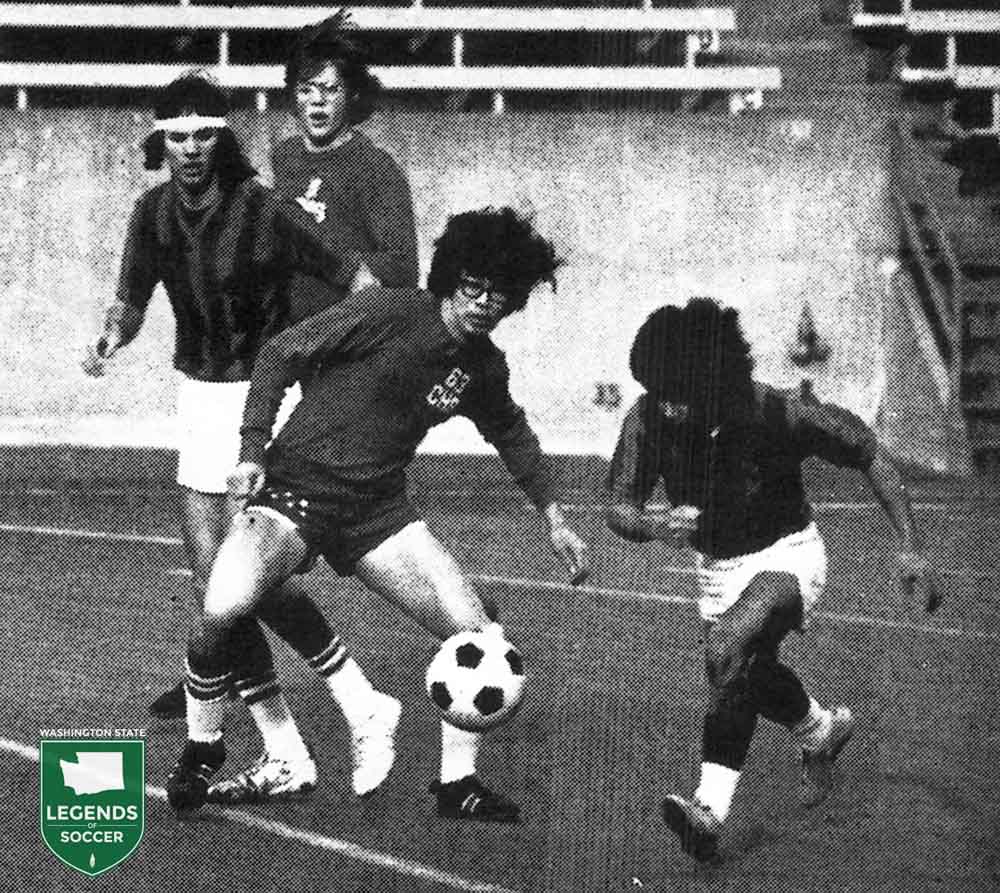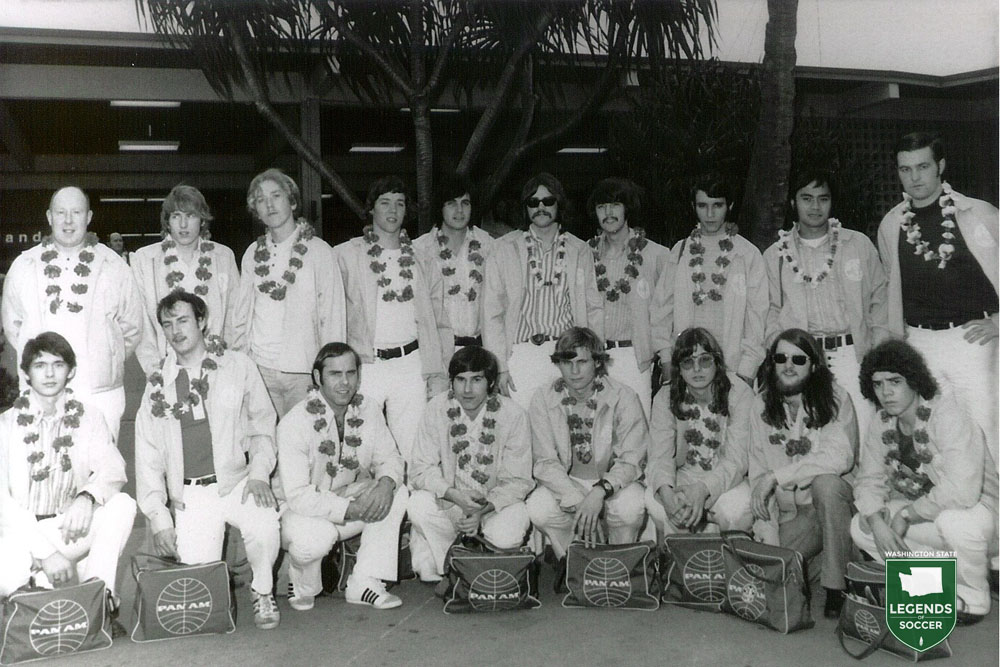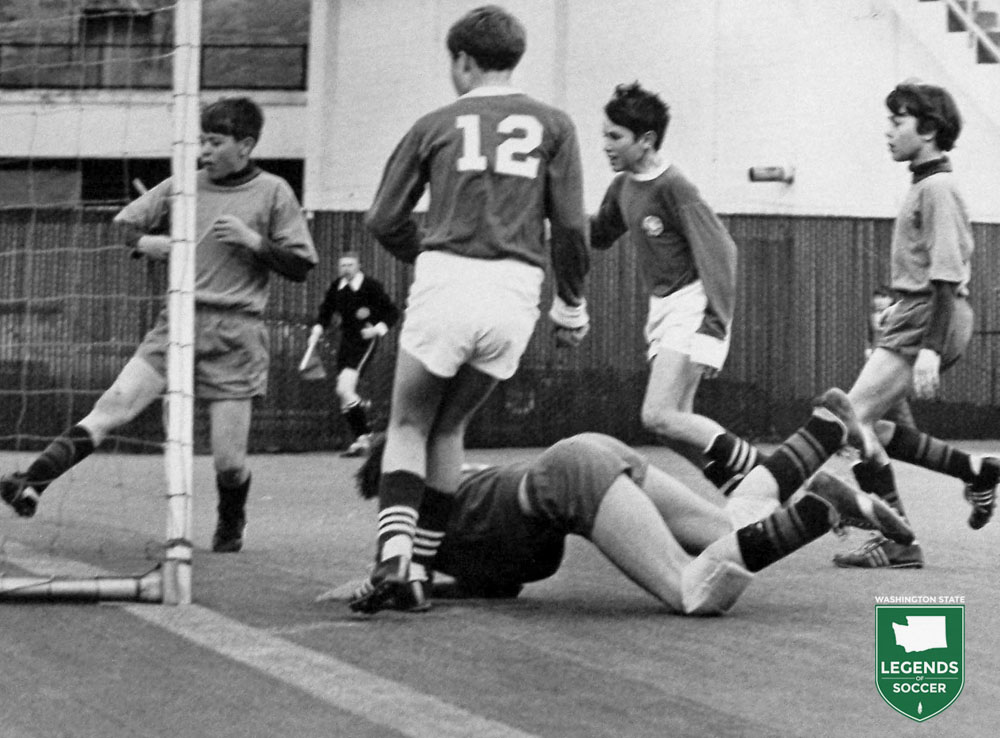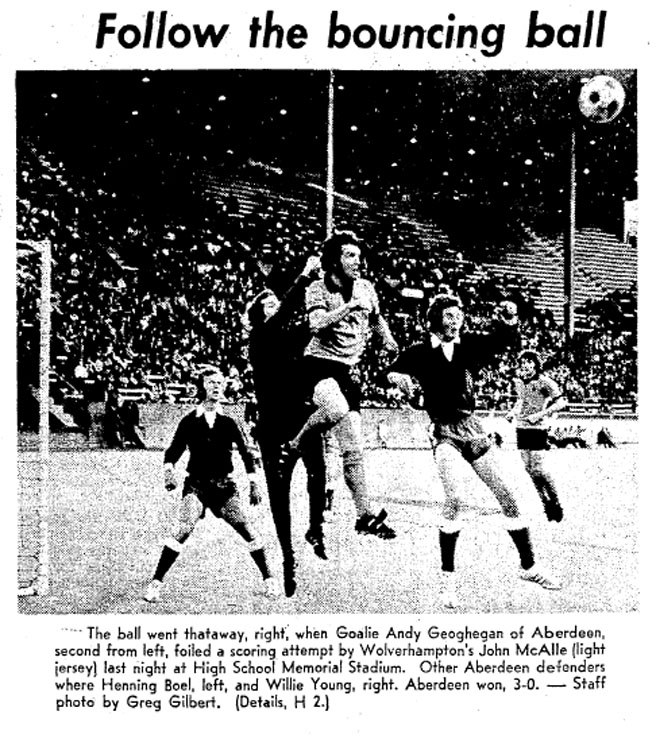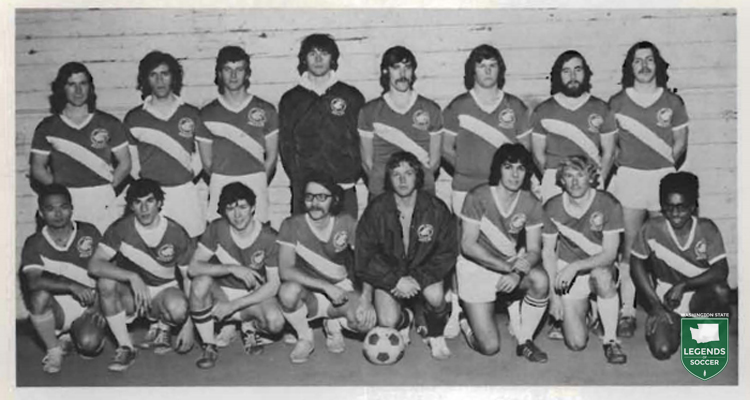Israeli Champs Arrive
August 18, 1972
Straight off reclaiming the Israeli championship once again, Maccabi of Tel Aviv visits Seattle, playing the Northwest Selects, comprised of stars of Vancouver and Seattle semi-pros and amateurs. Future Sounder Bernie Fagan comes south to play alongside Seattle Hungarians legends Les Fabri and Mike Kuczi. Maccabi prevails, 1-0, before 1,800.
Falcons Turned Back Again
November 21, 1972
For the second year in a row Seattle Pacific reaches the NCAA Division II tournament, only to again be turned back by Chico State. However, the Falcons, who end the regular season by winning nine and tying one, narrow the gap. After losing by seven goals a year earlier they fall, 3-2.
Seattle Wolves Defeat Germans
June 30, 1972
Billed as the state's first professional club, the Seattle Wolves debut with a 3-1 win over touring Wolfsburg-Goettingen of West Germany's second tier. If all goes well, Wolves owner Johnny Haas intends to petition for an NASL club in 1973 or '74. However, less than a thousand attend the Highline Stadium exhibition which stars guest player Jackie Charlton.
Vikings Crash in Challenge Cup
March 5, 1972
Olympia Brewery Vikings, missing their injured star, Bobby Hough, crash out of the National Challenge Cup, 6-1, in the West semifinal at San Francisco's Concordia.
Record Crowd at Husky Classic
October 14, 1972
A record crowd of 5,000 attends the final day of the Husky Classic at Husky Stadium. San Jose State beats Chico State in championship final. Earlier Seattle Pacific upsets Cal, 3-0, and UCLA defeats Washington, 2-0.
Vikings Advance in Challenge Cup
February 20, 1972
Billy Duckworth finds the game-winner for Olympia Brewing Vikings in 1-0 win over Tacoma Heidelberg in the Northwest regional final of National Challenge Cup at Highline Stadium. Tacoma goalkeeper Bob Lynch, only 18 and a Wilson High School senior, makes a triple save to keep Heidelberg in it.
Huskies Finally Reclaim Crown
November 4, 1972
Washington finally secures a conference championship, its first in four years, by bashing Western Washington 8-2 in Bellingham. The Vikings were three-time defending champions of the Northwest Collegiate Soccer Conference. The Huskies go undefeated (11-0-1) in NCSC play to finish three points clear of Seattle Pacific.
Olsen Brace Seals Vikings Win
January 9, 1972
Reidar Olsen's brace leads Olympia Vikings past Rainier Brewers, 4-1, to clinch the state league's first half title and Roosevelt trophy at Lower Woodland. Harold Myrold and Doc Grundy also score while Bob Berith tallies for the Brewers. The Vikings go on to finish 12-1-1 a week later. Triumph Continental (10-2-2) and Rainier (8-3-2) are next in the table.
First Summer Camp Opens
June 25, 1972
Northwest Soccer Camp begins when Cliff McCrath and Mike Ryan share with each other that soccer was growing so fast that neither of them can keep pace with the scores of requests from players, coaches, and parents to assist them with player development, coaching seminars, and training sessions. It all begins at Camp Casey on Whidbey Island: one week, 30 resident campers, four coaches and a budget of $2,200. Meals are donated and no cost to campers.
Cross-Border traffic
March 1, 1972
During February and March, Washington and British Columbia youth players flood the border crossings for the 10th annual Canadian Exchange Series, promoting the game as well as friendships between teams from the Seattle and Vancouver areas. In all, 703 teams from U8 to U16 participate.
State Begins Girls Play
June 26, 1972
At the Washington State Youth Soccer Annual General Meeting, girls' soccer becomes part of the organization, with state tournament play to commence in 1973.
New Leadership Installed
July 26, 1972
Tom Webb is elected president of Washington State Soccer Association, along with a new board that includes Jack Mickelberry as secretary-treasurer, replacing Eddie Craggs, who retires after more than 20 years at the post. Webb had earlier served as state youth president.
St. Joseph's Wins CYO
November 18, 1972
St. Joseph's gets a late header from Mike Gates to claim the CYO Cadet Division title, 3-2, over St. Luke's.
500 Watch Closed Circuit Euros
April 29, 1972
Over 500 watch two European Nations Cup quarterfinal doubleheader from Italy via closed circuit TV in the Seattle Coliseum. Cost: $8-10.
Forrest Fires Olsen's, Huskies Win Fourth
April 16, 1972
Behind Ward Forrest's hat trick, Olsen’s United defeats Highline Rebels, 3-1, in overtime of the state U17 final. A day earlier, the Newport Huskies won their fourth straight state title, taking the U13 final, 7-0, over Snohomish's Town & Country Chargers at Memorial Stadium. Stan Sawhill of U12 co-champs Newport Sharks is named the overall player of the championships, which started February 6 with 249 boys' teams across seven divisions.
First Girls' Tournament Held
January 16, 1972
The first statewide girls' tournament concludes in Federal Way with a couple host teams prevailing in the finals. Totem Hotshots edge Blue Barons, 1-0, in the 5th and 6th Grade division while Blue Devils blank Lynnwood Roadrunners, 2-0, in the junior high title match. The tournament is not a sanctioned state cup, and 18 of the 24 entries are from Federal Way.
Huskies Return to Postseason
November 25, 1972
Washington returns to the NCAA tournament for the first time in four years and, after remaining scoreless for the first half, is humbled by UCLA, 5-0. Once Bernardo Ortiz breaks the ice, the Bruins pull away, finishing with a 30-10 advantage in shots. UCLA goes on to face St. Louis in the NCAA final.
Girls Hold Championships
January 16, 1972
Federal Way Soccer Association organizes the state's first junior girls' tournament, with 25 teams in all. Totem Hot Shots win fifth and sixth grade division, 1-0 over Federal Way Blue Barons and Federal Way Blue Devils beat Lynnwood Roadrunners, 2-0, for junior high division at Federal Way High.
Pelé Visits Nearby
July 7, 1972
Diehard fans flock across the border to see Pelé and Santos visit Vancouver's Empire Stadium. Pelé doesn't score but his Brazil teammate Edu does twice to crush the B.C. Premier League All-Stars, 5-0, before 16,300.
Tacoma Heidelberg Prevails in NCC Marathon
February 13, 1972
In a marathon match at Highline Stadium, Tacoma Heidelberg ousts shorthanded Seattle Heidelberg in the second round of the National Challenge Cup. Roger Goldingay scores five goals for Seattle, who lose Heinz Ritter to a red card for striking referee Ben Patterson. It's 2-2 after regulation,4-4 after the first overtime and 6-6 after a second extra period. In penalties Allen Robinson converts the decisive shot (3-2) and Tacoma advances to face Olympia Vikings, who defeat Rainer Brewing in the other Northwest semifinal.
Wolves, Dons Meet at Memorial
May 24, 1972
Scottish runners-up Aberdeen ruin Wolverhampton's holiday in Seattle, 3-0. A crowd of 6,100 comes to Memorial Stadium. Dons' newly signed Barrie Mitchell scores twice, both headers past Wolves keeper Phil Parkes in first 32 minutes. It's Aberdeen's fifth straight win on their U.S. tour. Wolves finished 10th in England's top flight.
Craggs Celebrated
October 7, 1972
National Soccer Hall of Fame member Eddie Craggs, 75, is honored with a banquet. The State league championship trophy is named for Craggs, who states: "I had to coax them to leave the word 'memorial' out of the engraving. I figure to be around presenting it for years to come."
Rainiers Roar Back in Cup Semi
December 10, 1972
Rainier Brewing roars back from two goals down to catch Seattle Heidelberg and eventually prevail in penalties, 3-3 (4-3) in a Pacific Coast Coal Cup semifinal at White Center. Mike Kuczi converts a controversial penalty kick in the waning moments of regulation to rally from 3-1 down. The two teams are scoreless in overtime. Rainier will face Olympia Olys (6-1 winners over Hillwood Metro Volkswagen) in the cup final, which will be delayed three times by snow until April 15, 1973.
Lutes' Abe Honored
December 7, 1972
Pacific Lutheran's diminutive forward, Abraham Abe, is voted player of the year in the Northwest Collegiate Soccer Conference, despite the Lutes finishing a distant third behind Washington and Seattle Pacific. The Falcons' Ken Covell finishes as top scorer with 18 goals and Ward Forrest sets a new UW mark with 14.
UW, SPU Tie NCAA Champs
September 26, 1972
Eight-time NCAA champion St. Louis University would go on to take its ninth title less than three months later, but Harry Keough's Billikens do not emerge unscathed from their first visit to Washington. First, the Huskies and freshman keeper Ed Fillion hold SLU to a scoreless draw. One night later, out-shot 50-8, Seattle Pacific gets acrobatic saves from Rex Yoder and a long-range equalizer from Doug McKenna for a 1-1 tie at Memorial Stadium. St. Louis features Hermann Trophy winner and Olympian Mike Seerey among its many future professionals.
Five-a-Side
April 23, 1972
In the last of 31 30-minute games, Olympia Brewery Vikings defeat Seattle Heidelbergs, 5-1, for the championship of the 29th annual Five-a-Side tournament at Memorial Stadium. Reidar Olsen scores three goals.
Washington Boys Win Regionals
June 25, 1972
Bellevue's Olsen's United and Tacoma's Norpoint Royals win boys U17 and U11 West Coast championships in Portland. Olsen's ends a B.C. stranglehold on U17 division, taking title, 2-1 in overtime, on goals by brothers Ward and Dave Forrest. Danny Hopper scores Norpoint's championship game winner.
Locals Humble Austrians
July 30, 1972
Seattle Heidelbergs of the state league defeat Vienna Sandt, 4-1, at West Seattle Stadium. It's only the second loss by Austrians in 18 touring games over three years. Abu Kamara, Sierra Leone student at UW, stars on defense for the Heidelbergs. Eli DeOliveira scores two goals for Seattle. The previous night Sandt drubbed Tacoma Heidelberg, 4-0, at Baker Stadium.
Yoder Saves 14 But Fullerton Scores 3
October 7, 1972
Seattle Pacific goalkeeper Rex Yoder saves a record 14 shots in vain as Cal State Fullerton completes a two-match sweep of the Huskies and Falcons with a 3-1 win at Interbay Field. Rafael Ramirez scores twice and sets-up the third for the Titans. Yoder ties his mark a month later in an NCAA tournament loss at Chico State.
Charlton Clinics Return
June 18, 1972
England and Leeds star Jackie Charlton returns to hold June youth clinics for more than 500 in Bellevue, Federal Way and Seattle.
State League to Turf
March 5, 1972
A longtime institution on Sundays at Lower Woodland, the state league's first division moves to the Astroturf of Memorial Stadium with a triple-header and admission fee of $1.50 for adults.
Rainiers Take State Crown
April 30, 1972
Mike Kuczi's brace leads Rainier Brewers to a 5-1 victory over defending champion Olympia Brewing Vikings at Memorial Stadium. The Vikings, playing without injured star Bobby Hough, had won the first half of the season's first division and Rainiers had claimed the second half. Washington State won the second division and Pacific Lutheran the third tier.
Shoreline High Wins State
March 2, 1972
Gordy McIntyre's second-half goal for Shoreline High School proves the difference in the state's first high school championship game against Everett, 1-0. The unsanctioned title featured the winners of the Metro and Wesco. McIntyre takes an Al Leiter pass and chips over busy Seagulls keeper Steve Anderson. Leiter and Gordie Severeid hit the post and crossbar, respectively.
UW Extends Lead Through Forrest
October 30, 1972
Ward Forrest's hat trick propelled Washington to a 3-2 victory over Western Washington, extending the Huskies' conference lead over Seattle Pacific to an almost insurmountable seven points.
Rainier Brewers Win Second Half
April 16, 1972
Bob Shoemaker's lone goal seals the second-half state league championship for Rainier Brewers. Mike Kuczi threads a through ball for Shoemaker to finish for a 1-0 victory over Auburn Sorensen's at Lower Woodland. The Brewers (7-1-0), upset by Triumph Continentals a week earlier, win the Puget Sound Navigation trophy and will face Olympia Brewing for the overall state title.
Soccer a Threat to Football?
January 20, 1972
Junior high school principals in Kingco approve adding boys soccer, and since it is not yet a sanctioned sport for WIAA, players can participate in both school and club games during the fall.
The kids all stay with families, but any parents who travel with the teams stay in hotels. For the parents, it can almost be a second honeymoon, getting rid of the kids for a night.
— Tommy Grieve, youth publicist, regarding Canadian Exchange
We started (four years ago) with 40 boys. Now we have 2,000 boys and girls in an area that equals the Lake Washington School District.
— Burt Dutton, co-founder, Lake Washington Junior Soccer Association
Soccer has been a God-send for us. It helps make Glenn’s life more normal. It has helped him to get along with other boys better it has taught him a lot…I’m very grateful to soccer.
— Alice Peterson, whose 10-year-old deaf son Glenn plays for the Interbay Gulls
As the sport grows in popularity because of the kid program, markets will also grow. Here in Seattle, we feel we already have a market. We consider Seattle a soccer city.
— Phil Woosnam, NASL Commissioner
1972 Collegiate Men's Records
| Gonzaga (club) |
n/a |
| Pacific Lutheran |
6-5-1 |
| Puget Sound |
2-7-3 |
| Seattle University |
5-6-1 |
| Seattle Pacific |
11-4-3 |
| Washington |
12-4-2 |
| Washington State (club) |
12-10-7 |
| Western Washington (club) |
4-6-2 |
| Whitman (club) |
n/a |
1972 Washington State Youth Cup Winners
| Age |
Boys |
| U9 |
St. Vincent Eagles (FWSA) |
| U10 |
Lake City Hawks (SYSA) |
| U11 |
Lakecrest Packers (FWSA) |
| U12 |
Ansa Quicksteps (TPCJSA) |
| U13 |
Newport Sharks (EYSA)/Pacific Hawaii Knights (SSCJSA) |
| U14 |
Newport Huskies (EYSA) |
| U16 |
Lake Hills Raiders (EYSA)/R&S Vikings (TPCJSA) |
| U17 |
Olsen's United (EYSA) |
 1971
1971
